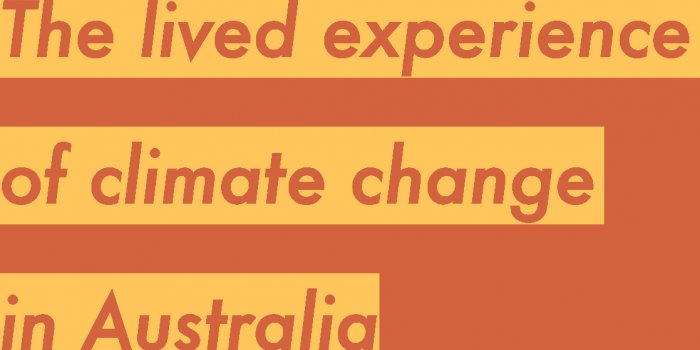
The Lived Experience of Climate Change in Australia (2014 - 2016)
"The climate is changing, it's definitely changing. But it's not because of climate change!"
- drunk man in bar, Napier, NZ (2012)
“global warming/climate change is a headf@#k”
- @alexmatter, Twitter (2011)
I am currently a Journalism PhD candidate at Monash University, researching a book about the lived experience of climate change in Australia, provisionally called Hot Cold Hot: The Lived Experience of Climate Change in Australia. This book will combine oral history and literary journalism methodologies (basically, I'm going to do a lot of really long interviews with a range of people). The book will be researched in 2014-2015 and published in 2016, and is intended for a general audience.
PROJECT SUMMARY
There is overwhelming scientific consensus on the issue of anthropogenic (human-caused) climate change. However, climate change is not just a scientific phenomenon; it is also a cultural phenomenon. As such, climate change affects almost every aspect of our lives, from our religious/philosophical ideas about what it means to be human, through to the countless (un)ethical consumer choices we are faced with every day. In this broader context, there is unavoidable disagreement and conflict about what climate change ultimately ‘means’—and, more importantly, what we should be doing about it.
Journalism is an essential part of the 'cultural circuit' (Hulme, 2009) that determines how people understand and experience climate change. However, the institutions of Australian journalism are particularly ill-equipped to represent the significance of climate change to the public. The Murdoch press’ purposeful distortion and confusion of climate science for political-ideological reasons is only the most blatant example of this. However, all newsroom journalism, with its focus on the here-and-now and its preference for stories of conflict and celebrity, struggles to engage with the climate change ‘story’—which is mind-bogglingly complex, incremental, lacking in traditional ‘conflict’, and of extremely long duration, with implications for centuries to come. At its heart, this journalistic failure is a failure ofcontextualisation.
To make the journalistic concept of ‘public interest’ properly meaningful to our discussions of climate change, journalism needs to provide the public with nuanced and diverse accounts of how people currently acutally experience and make sense of climate change. The practices of long-form cultural journalism and oral history prioritise the everyday experiences of ordinary people, and focus on the 'Big Picture'. This sense of context (cultural, social, historical) is needed for an in-depth investigation of people’s lived experiences of climate change.
INTERVIEW LOCATIONS
I will be talking to a range of people in the following climate change 'hotspots' around Australia:
- the Cairns region, far north Queensland (near the endangdered Great Barrier Reef)
- the Darwin region, Northern Territory (suffering from increased sea levels and biodiversity loss)
- the Perth region, southwest Western Australia (exposed to reduced rainfall)
- Inner Melbourne, Victoria (a 'cultural hotspot' containing the highest concentration of Greens voters in Australia)
- Kinglake & Marysville, Victoria (sites of the 2009 Black Saturday bushfires, Australia’s worst natural disaster)
- the Mullumbimby region, northern New South Wales (a cultural hotspot for 'self-funded retirees, hippies and burnt-out tree-changers' aspiring to low-carbon lifestyles)
- the Morwell region, Victoria (site of the Hazelwood Coal Mine Fire, 'one of the largest, longest running and most complex fires in the State’s history').
Map of Australian climate change hotspots
TYPES OF LIVED EXPERIENCE
Hot Cold Hot: The Lived Experience of Climate Change in Australia will investigate the relationships between individuals’ views, their values, and their lived experiences of climate change. This will include a spectrum of personal experience, including but not limited to:
- the direct experience of an extreme weather event, such as bushfire
- the indirect experience of an extreme weather event via the media and/or interactions with other people
- the experience of a chronic, long-term weather event, such as drought
- the experience of the science, politics and/or ethics of climate change via the media and/or interactions with other people
- the experience of making personal lifestyle and/or occupational changes due to one’s perceptions of climate change
- the experience of being confused, unsure and/or ambivalent about the reality and/or significance of climate change
- the experience of having no experience of climate change whatsoever.
I am interested in the subjective, the emotional, the bewildering, the inconsistent, the paradoxical, the hypocritical, the upsetting and even the blackly humorous aspects of First World life under climate change. Faced simultaneously with “the great moral challenge of our generation” (Rudd, 2007) and “quite possibly THE most boring subject the science world has ever had to present to the public” (Olson, in Revkin, 2010), Hot Cold Hot: The Lived Experience of Climate Change in Australia will respond to such ontological incongruity not (only) with self-righteousness, but (also) with gallows humour.
MORE
If you would like to read about my project in more detail, download this PDF
If you would like to find out more about this book-to-be, drop me a line at my Monash email address:
tjdoi1 [at] student.monash.edu
If you would like to read about my own lived experiences of climate change as an ignorant Antipodean tourist in Mongolia, you can